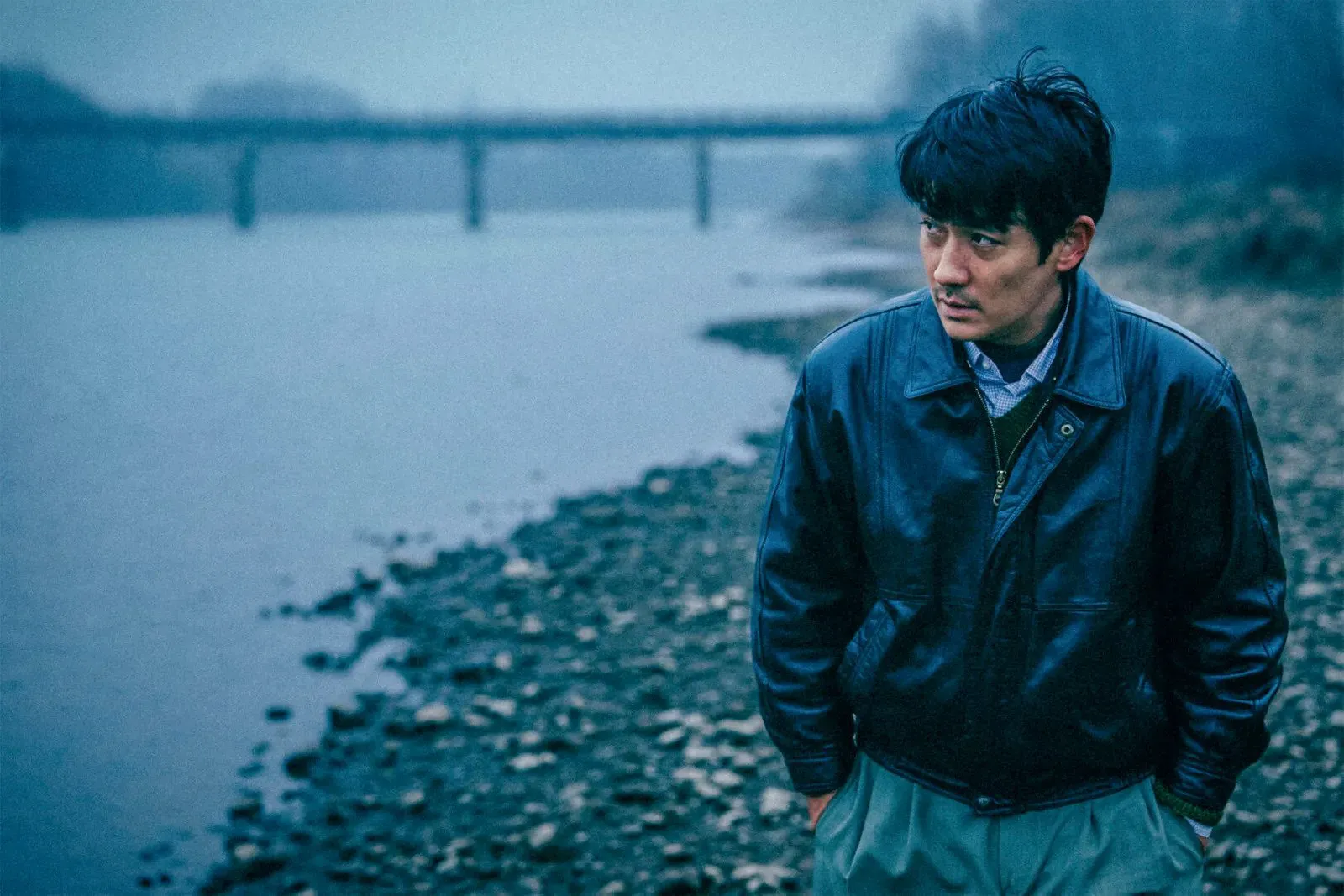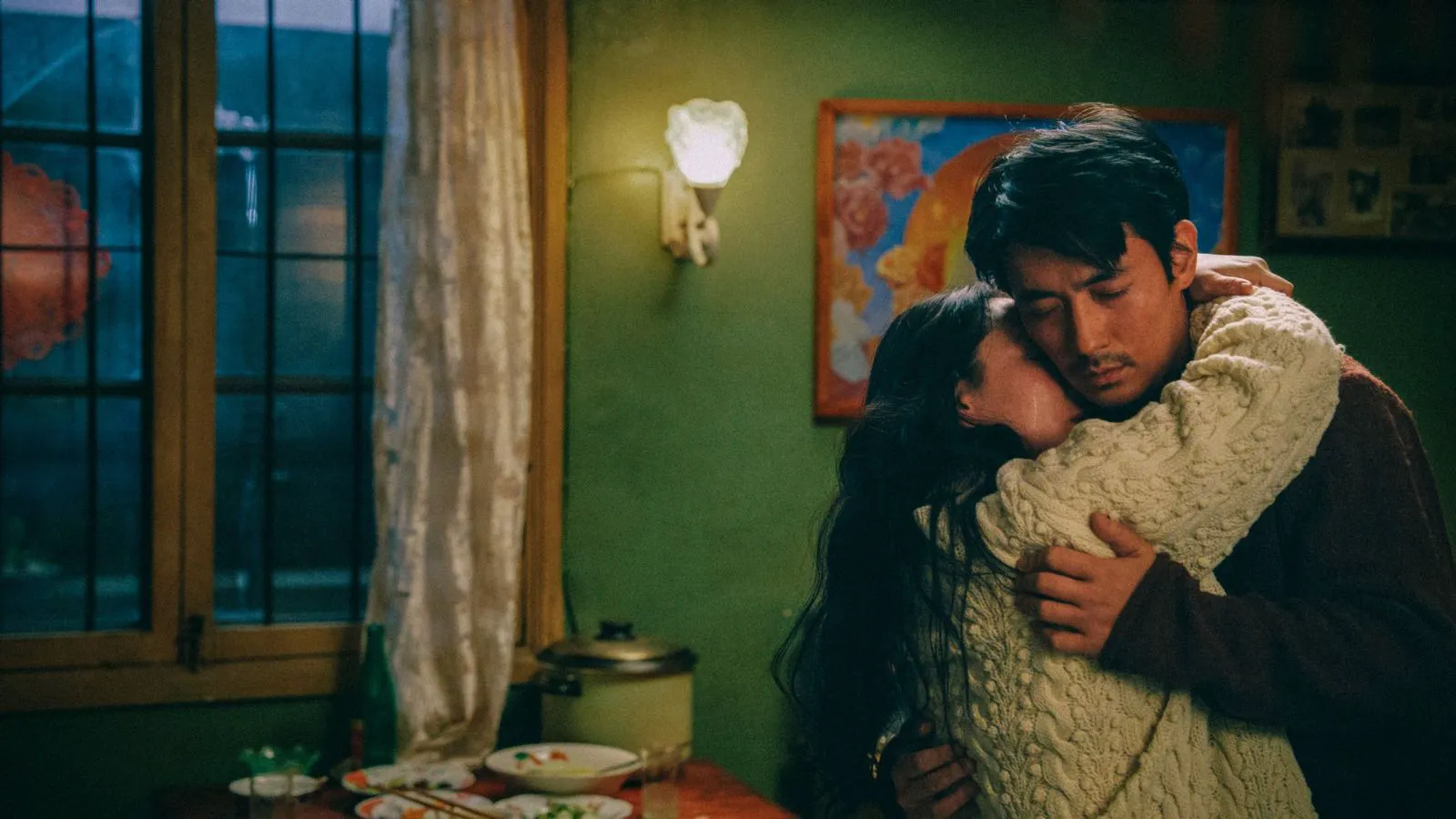In 1995, a small industrial town in Zhejiang Province, eastern China, becomes the backdrop for a grim discovery. The body of Cao Yang, an elderly woman who raised geese, is found by the river. Suspicion immediately falls on Tong Linkai, a local vagrant with mental health issues, whom the victim had taken in months prior. However, police inspector Ma Zhe (played by Zhu Yilong) is hesitant to jump to conclusions, despite pressure from his superiors to quickly close the case. A woman’s handbag containing an audio cassette is found at the crime scene, and Xu Liang (played by Kira Wang), a hairdresser seen near the river in a long-haired wig, adds another layer of complexity. The investigator delves into all possible leads, determined to uncover the truth.

Zhu Yilong as Ma Zhe in “Only the River Flows”
From Page to Screen: Adapting Yu Hua’s Story
“Only the River Flows” is an adaptation of “Mistakes at the River,” a short story by contemporary Chinese writer Yu Hua. Zhang Yimou considered adapting the story in the early 1990s but ultimately deemed it unfilmable, instead adapting Yu Hua’s novel “To Live,” which won the Grand Prix at Cannes. Nearly 30 years later, Chinese director Wei Shujun took on the challenge. This young filmmaker is considered one of China’s most promising talents. His debut road movie, “Striding Into the Wind,” about a sound engineer fresh out of college, was selected for Cannes but was canceled due to the pandemic. Shujun’s second film, the dramedy “Ripple of Life,” participated in the Directors’ Fortnight, and “Only the River Flows” was featured in Un Certain Regard last year. It’s speculated that his next film may be in the main competition at Cannes.

Zhu Yilong as Ma Zhe in “Only the River Flows”
A Noir with a Twist: More Than Just a Murder Mystery
The film opens with a quote from absurdist Albert Camus, signaling that this is not a typical murder investigation. The director is less interested in the detective plot and more focused on exploring the social landscape of the Chinese town. Most residents work at a textile factory, and life is monotonous and bleak. The economic boom is still far off, leaving the province in a state of decay. The already dreary autumn scenery is worsened by constant rain.
The Reluctant Investigator
The head of police plays table tennis with his subordinates and shows little interest in finding the truth. With a plausible suspect connected to the victim, why dig deeper? The case would likely be closed if not for Ma Zhe, who becomes deeply involved in the investigation, potentially complicating matters. From the start, the detective stands out. While his colleagues wear uniforms, Zhe sports a leather jacket and isn’t afraid to beat his boss at ping-pong. At home, a pregnant wife awaits, but the inspector seems to hide from his doubts and difficult questions in his work. The audience sees a protagonist in an existential crisis and, of course, an unreliable narrator. By the film’s midpoint, the narrative fragments into separate episodes bordering on dreams and reality. Whenever Zhe closes his eyes, he sees a first-person short film featuring suspects and witnesses. The provincial ennui consumes the police officer; the search for the killer seems pointless, the authorities don’t care about the victim, and the future is uncertain. Zhe can’t even remember if he received an award at his previous job. His superiors are eager to award him again, while a former colleague claims the investigator was perpetually drunk. The identity of the killer becomes secondary; in this depressive industrial area, anyone could commit a brutal crime – there are enough oddballs.
Zhu Yilong as Ma Zhe in “Only the River Flows”
A Dreamlike Reflection of a Bygone Era
Director Wei Shujun, born in 1991, has only vague memories of the 1990s. “Only the River Flows” is a fantasy or even a dream about a past era. The question is, whose dream is it? The young director doesn’t aim for realism, constantly reminding the audience that this is just a film. Cinema seems to be a central theme in Shujun’s work. In “Only the River Flows,” the image is stylized to resemble film, with graininess appearing on the screen. The police station is unexpectedly located in an abandoned cinema, and investigations and meetings take place on the stage. The film is full of stylish and effective episodes, lacking only dynamism.
Echoes of Genre Classics
“Only the River Flows” echoes other notable examples of the genre. The general helplessness of the police, death in a rural area, and brutal interrogation methods recall “Memories of Murder.” The constant rain evokes David Fincher’s “Seven.” However, the classic American noirs, where the detective’s character is more important than the investigation, seem to have had the most significant influence on the Chinese director. Only the femme fatale is missing. Like Diao Yinan’s “Black Coal, Thin Ice” and Park Chan-wook’s “Decision to Leave,” the truth slips further away from the detective with each passing minute, becoming increasingly elusive.
“Only the River Flows” may frustrate fans of classic thrillers about the search for a maniac, especially those accustomed to serial dramas. This is auteur cinema that subverts genre conventions, an existential noir in which all the characters appear as unfortunate victims of blind fate, and the tension barely increases towards the end. Perhaps the goose-raising old woman was even lucky, as the other characters have either gone mad or are on the verge of it.